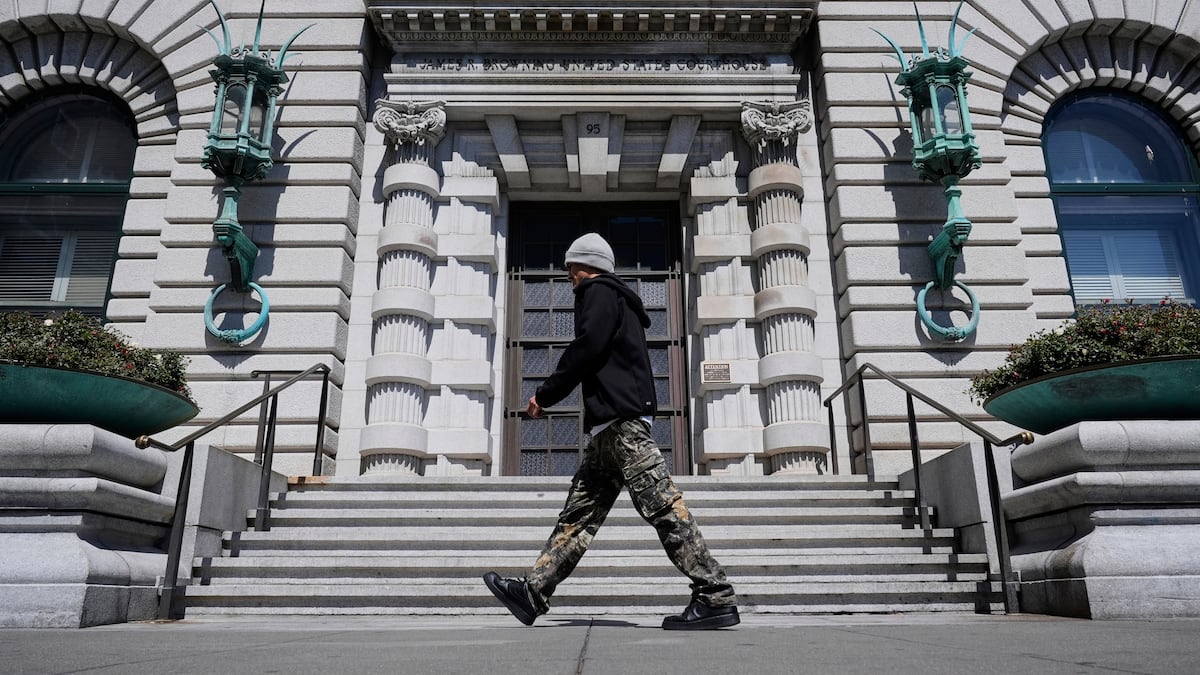Responsive YouTube Video
A federal appeals court expressed skepticism Thursday toward a temporary order blocking President Donald Trump from deploying members of the Oregon National Guard to a federal immigration building in Portland.
Attorneys for the Trump administration argued before a three-judge panel that the president has the authority to federalize and deploy the Guard over Gov. Tina Kotek’s objections.
They asked the U.S. Court of Appeals for the 9th Circuit to overturn a temporary restraining order issued Saturday by U.S. District Court Judge Karin Immergut. Federal law allows the president to deploy Guard members if there’s an invasion from a foreign nation, a rebellion or if the president cannot carry out federal laws with “regular forces.”
Immergut, who was nominated by Trump, found the administration did not clearly prove those were the conditions taking place in Portland. She said the White House, therefore, could not send in troops to deal with protests at Portland’s U.S. Immigration and Customs Enforcement building.
“The President’s determination was simply untethered to the facts,” Immergut wrote in her initial ruling.

A man walks past the James R. Browning United States Courthouse building, a courthouse for the U.S. Court of Appeals for the 9th Circuit, in San Francisco, Aug. 27, 2025.
Godofredo A. Vásquez / AP
The appeals court panel indicated in its questioning that the president has sweeping authorities when it comes to law enforcement. The panel was made up of Judges Ryan Nelson, Bridget Bade and Susan Graber. Nelson and Bade were appointed by Trump during his first term, while Graber — a former Oregon Supreme Court justice — was appointed by President Clinton.
The judges also used Thursday’s hearing to question whether the judiciary has the authority to put limitations on National Guard deployments if the president believes it is necessary.
“I am sort of trying to figure out how a district court of any nature is supposed to get in and question whether the president’s assessment of executing the laws is right or wrong,” Nelson stated.
Eric McArthur, with the U.S. Department of Justice, told the appeals court deployment is targeted and for the protection of a federal building. He argued the president wins on both the law and the facts on the ground in Portland.
McArthur argued the law authorized the president to call up the National Guard when “violence and threats of violence directed at federal officials and facilities has significantly impeded federal law enforcement.”

The Ninth Circuit Court of Appeals heard arguments on Oct. 9, 2025, about the Trump administration’s efforts to federalized 200 members of the Oregon National Guard. The panel was made up of Judges Susan Graber (top left) Ryan Nelson (center), Bridget Bade (top right). Stacy Marie Chaffin (bottom left), an assistant attorney general with the Oregon Department of Justice, argued for the city and state. The Trump administration was represented by Eric McArthur (bottom right), with the U.S. Department of Justice.
Screenshot from Ninth Circuit
Attorneys for the state of Oregon and city of Portland acknowledged occasional violence had happened at ongoing ICE building protests, but argued that sending the military for what is largely protected First Amendment conduct is an overreach of executive power.
Stacy Marie Chaffin, an assistant attorney general with the Oregon Department of Justice, acknowledged the president is allowed great deference when federalizing the National Guard.
“That deference has a limit and that limit is this case where the president’s determinations are untethered from reality,” Chaffin said.
Protests at the ICE facility have frequently seen fewer than two dozen people gather nightly since June. On a few nights, those protests drew hundreds of people, and federal officers have used tear gas and other crowd control weapons to disperse people.
Gas is deployed at the U.S. Immigration and Customs Enforcement facility in Portland, Ore., Oct. 4, 2025.
Eden McCall / OPB
Leaders with the Portland Police Bureau have testified about the dwindling nature of the protests since June. In September, protests at the ICE building throughout rarely drew more than a few dozen.
“Mostly sitting in lawn chairs and walking around,” a Portland Police officer wrote Sept. 26, the day before Trump announced he would deploy the Guard to Portland. “Energy was low, minimal activity.”
But McArthur highlighted for the appeals court a single day from that same police record. On Sept. 20, McArthur noted “a black blocker with a large sword or stick” assaulted another person and protests would “flip off, scream and throw objects” at marked police cars when they passed by.
Protesters wave to passersby as they wait outside of the U.S. Immigration and Customs Enforcement building in South Portland, where U.S. Department of Homeland Security Secretary Kristi Noem is visiting, Oct. 7, 2025.
Kristyna Wentz-Graff / OPB
“These are violent people,” McArthur argued. “At any point we let down our guard, there is a serious risk of ongoing violence.”
He argued the one of Immergut’s “key errors” was only considering what was happening in the days and weeks before the president officially called up the Oregon National Guard on Sept. 28.
During a protest on June 14, McArthur said, protesters threw rocks, launched fireworks at officers with the Federal Protective Service and tried to break into the ICE building.
“FPS officers were forced to deploy their long guns but did not use them,” Robert Cantu, the agency’s regional deputy director stated in a declaration filed with the Appeals Court.
“To date, 115 FPS officers have had to deploy to Portland,” a situation Cantu described as unsustainable with protests and other security concerns in other parts of the country. He did not say how many were currently in Portland.
McArthur also told the panel some officers had returned home. He argued the government has limited officers at its disposal.
Later, McArthur told the Appeals Court judges: “The president is entitled to say, ‘Enough is enough’ and bring in the National Guard to reinforce the regular forces.”

Federal officers arrest a protester outside the ICE facility in SW Portland. Earlier on, a small group of demonstrators broke through the front door to the building, June 14, 2025.
Troy Brynelson / OPB
When it was her turn, Chaffin told the court, statements from law enforcement about being short staffed are not enough.
“That is not a reason to bring the military into the streets of Portland or any other city in the United States,” she said. “There needs to be something more than a deficit of employees to raise to the level of such a significant incursion into the sovereignty of a state.”
Bade pushed back, saying the the deployment is limited to federal property.
“I saw quite a bit of that language and the motions suggesting that National Guard members would be deployed to patrol the streets of Portland,” the judge stated. “I don’t think the government has ever said that that is the intent. The idea is to protect the building so they can remain open federal personnel.”
Chaffin said the order was to protect any federal personnel and buildings, noting those are throughout the city.
Later, she said it was the job the Federal Protective Service to respond to both violent and nonviolent protests. She argued there were other agencies who could help too, when needed and whatever response deemed necessary by the federal government, doesn’t fall entirely to one agency.
“We have a ton of law enforcement agencies under the president’s control,” Chaffin told the judges.
“The problem that I have with this argument,” Nelson said, “is the president gets to direct his resources as he deems fit.”
Nelson said it was “a little counterintuitive” for the city of Portland to tell the executive branch to respond differently.
“Now, I understand there’s a statute here and we’re going to have to review that,” he said, “but this goes to the level of deference that I think the president is entitled to in these circumstances.”
Chaffin acknowledged there are things happening outside the view of the public and known only within the executive branch. But, she argued, the Trump administration “did not present any evidence that the sporadic violence was part of an organized attempt to overthrow the government, and I think that’s what they’re asking this court to potentially look at.”
U.S. Department of Homeland Security Secretary Kristi Noem stands on the roof of the U.S. Immigration and Customs Enforcement building in South Portland on Tuesday, Oct. 7, 2025.
Eli Imadali / OPB
A cadre of conservative social media influences, Department of Homeland Security Secretary Kristi Noem and the president have repeatedly claimed that Portland is under siege. The president has made similar claims about Memphis and Chicago, where National Guard troops from Texas were deployed as of Thursday morning to assist federal law enforcement.
The appeals court judges did not immediately issue a ruling, but said that they would offer their opinion as quickly as possible.
